It was almost 20 years ago that Thomas Friedman, the Pulitzer Prize-winning author and New York Times columnist, wrote his visionary book The World Is Flat.
Freedman wasn’t a “flat-earther,” of course. He used the metaphor of a “flat world” to describe the global economy and its widening playing field for businesses and knowledge workers. The world he pictured has come to pass, with lower barriers to entry and expanded opportunity through trends like outsourcing and offshoring.
Since Freedman’s book became a best-seller, outsourcing in general (and software development outsourcing in particular) has skyrocketed, and its growth shows no signs of slowing.
In fact, at the time of this blog post’s publication, a recent study predicted that software development outsourcing would likely grow by 70% in the next year.
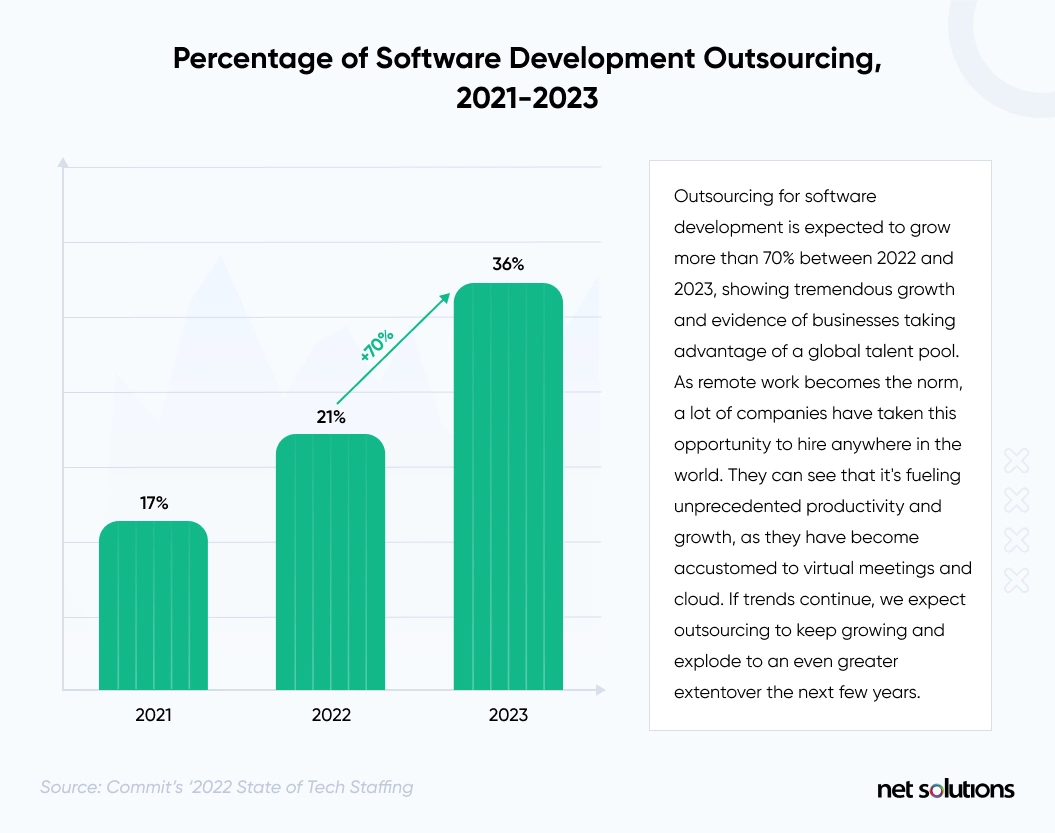
The global events of the past two years have led to a phenomenal increase in outsourced software development – and this shows signs of staying on beyond 2024. Cost-efficiency was the primary reason for this trend.
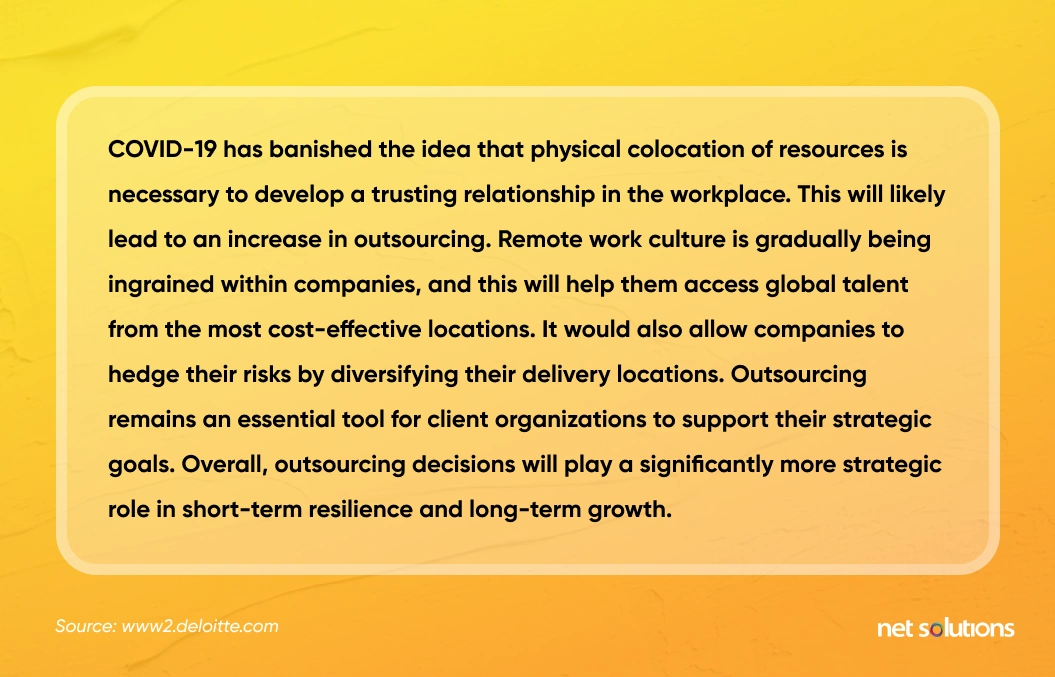
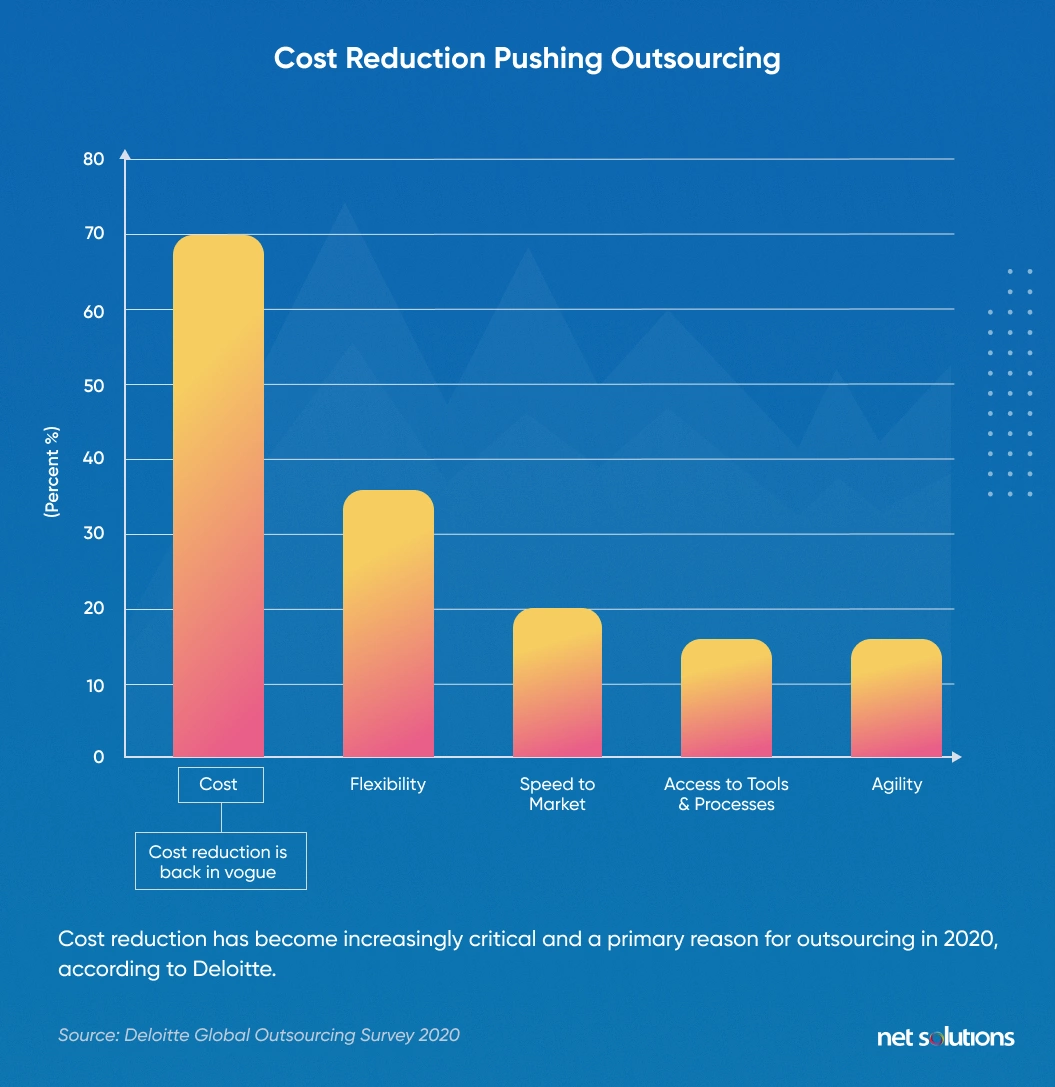
Are you considering outsourcing at least some aspect of your software development? This blog post will help you decide between onshore vs offshore outsourcing, highlighting the pros and cons of each approach.

We respect your privacy. Your information is safe.
What is an Outsourcing Software Development Model?
An outsourcing software development model involves hiring an external team to handle some or all of a company’s software development. A company might hire offshore or onshore software development teams to handle various tasks, including software design, User Experience (UX) optimization, coding, project management, and Quality Assurance (QA).
General Benefits of Outsourcing Software Development
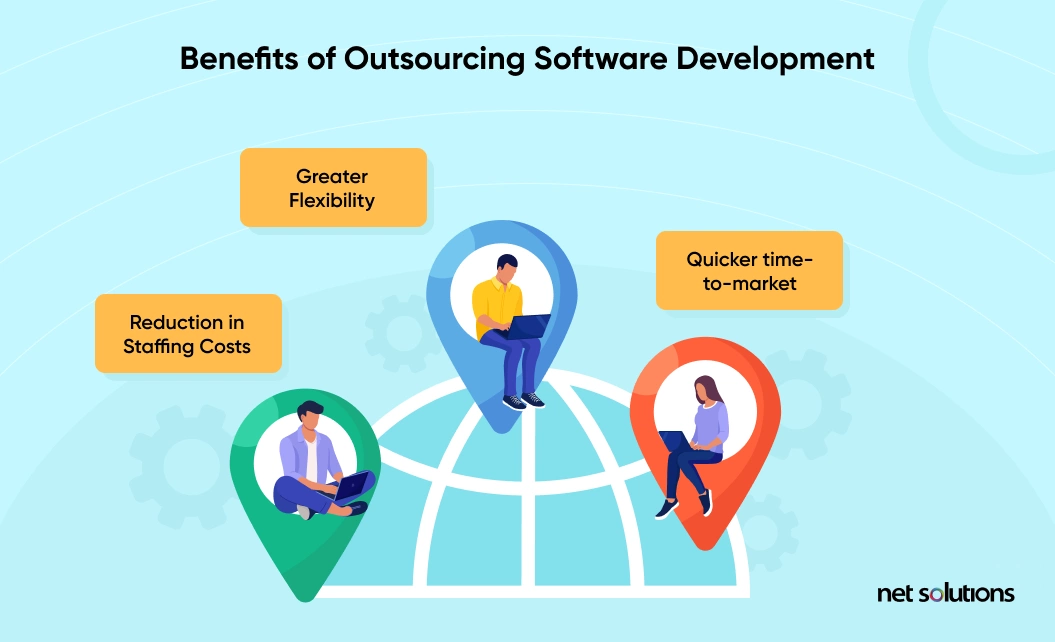
Outsourcing software development, whether onshore or offshore, comes with several benefits, including:
1. Reduction in staffing costs
Any Human Resources professional will tell you that hiring internal staff comes with multiple hidden costs. Depending on the country, full-time employers may have to cover health insurance, payroll taxes, family leave, sick leave, a portion of social security, and other benefits.
When you hire an outsourcing partner, those costs are covered by your partner and built into their price, and you don’t need to pay a dime for your developers’ equipment, office costs, etc.
According to the U.S. Small Business Administration, all these costs mean you’ll pay 25 to 40 percent more than your employees’ base salaries when you hire in-house.
2. Greater flexibility
Companies that outsource some or all of a development project will have an easier time scaling or reducing outsourced support when circumstances call for it. Those that only hire internal staff will struggle when faced with changing market conditions, shifting priorities, or immediate demand for new features.
3. Quicker time-to-market
Development partners with proven track records can often increase your time-to-market by either supplementing your workforce or taking over a project in its entirety. After all, experienced development firms are used to working on tight timelines, and the good ones have systems in place to address the hiccups and meet their deadlines.
An Overview of Onshore vs. Offshore Software Development Models
Once you’ve decided to outsource any part of your software development, you’ll need to choose a development partner overseas (offshore outsourcing) or one within your home country (onshore outsourcing).
Google Search gets inundated yearly with people who want to know which is better, onshore vs offshore outsourcing. The reality is that both models have their advantages and disadvantages. An excellent offshore partner offers tremendous value, but only when your partner has a firm grasp of English, understands your culture, and is willing to adapt to your time zone (if that’s important to you).
You don’t have to consider those issues with an onshore development partner, but onshore outsourcing comes with its own set of challenges, from higher costs to drawing from a small talent pool.
Let’s dig into both approaches and explore the pros and cons of onshore outsourcing vs offshore outsourcing.
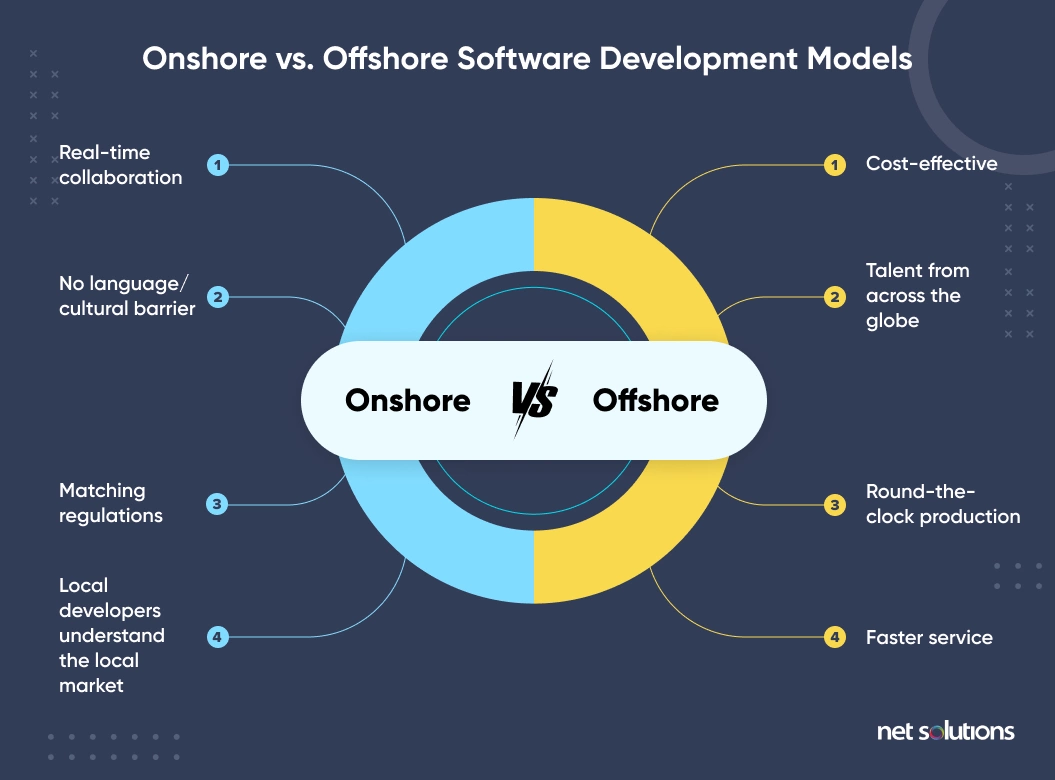
Onshore software development
Choosing an onshore software development partner has both advantages and disadvantages.
Benefits of Onshore Outsourcing
Here are some of the pros associated with onshore outsourcing.
1. Real-time collaboration
Working with an outsource partner within the same time zone can offer more opportunities for real-time collaboration since the time difference is never that big. You might even have the opportunity for occasional live meetings.
Some offshore outsourcing partners are willing to adapt to their clients’ work hours—we do that at Net Solutions when our clients need it. However, not every offshore development team is willing to do that, so if that matters to you, be sure to ask prospective offshore development partners if that’s an option.
2. No language barrier
Communication challenges arising from a language barrier are typically not an issue with onshore outsourcing.
3. Matching regulations
When choosing an outsource partner within the same country, state, or province, you’re far more likely to deal with someone subject to the same labor, taxation, and intellectual property laws. That can make some processes smoother.
4. In-person meetings
You can have live, in-person meetings if your outsourcing partner is nearby. Of course, in the post-Covid era, we’ve all become so used to Zoom meetings and remote working that in-person meetings might feel antiquated. If you’re not attached to face-to-face meetings, this won’t be a factor for you.
5. Local developers understand the local market
If you’re serving a local audience, working with a local outsourcing partner means they’ll likely understand your market better than someone in another country. Of course, if this matters to you, you don’t necessarily need to abandon the idea of outsourcing your software development to an offshore provider. Just be sure to choose someone who understands your culture and has experience serving your market.
Disadvantages of Onshore Outsourcing
Here are some of the cons associated with onshore outsourcing.
1. Higher price tag
Companies headquartered in places like the United States, Western Europe, and Asia will be forced to pay a premium if they want to work with developers in their home countries. These firms simply can’t compete on price due to higher living costs in those places.
2. Reduced talent pool
When you go international, you’ve access to a world of talent. Restricting your search to onshore developers limits your reach and your options.
Offshore Software Development
Choosing an onshore software development partner has tremendous advantages and a few potential pitfalls. If you know what to look for when choosing an overseas development partner, you can take advantage of the benefits while avoiding problems.
Advantages of Offshore Outsourcing
The following are some of the pros associated with offshore outsourcing.
1. Offshore outsourcing is highly cost-effective
Cost should never be your sole consideration when hiring an outsourcing partner, but it’s a factor for any business. Choosing the right overseas partner can maximize value, reduce costs, and boost your odds of ending up with a profitable software product.
2. Talent from across the globe
Countries like India have a vast reservoir of young, sharp software engineers eager to impress. You’ll miss tapping into that global talent pool if you stay local.
3. Round-the-clock production
A positive flip side to having an outsource partner in a distant time zone. When you choose an offshore outsourcing partner, you can benefit from asynchronous work.
Kitco hired Net Solutions to handle QA testing for their mobile app. Since we were on the opposite side of the world, our dedicated QA team tested the code that Kitco’s developers built during the day. After a day’s work, the Kitco developers went home, got a good night’s sleep, and woke up the next day with bug reports from our QA team in their inbox. This kept things moving on a 24-hour cycle and significantly increased the app’s time-to-market.
4. Faster service
Offshore development firms can often provide quicker turnaround, thanks to their large pool of talented professionals, the time zone advantage, and reduced costs.
Disadvantages of Offshore Outsourcing (with Solutions!)
Here are some cons associated with offshore outsourcing and simple ways to avoid these common issues.
1. Language barrier
Software design and development is complicated and often requires nuanced communication to bring your company’s vision to life. Choosing a team packed with people who don’t speak your native language can result in delays, rework, and projects that run over budget.
What’s the solution to a language barrier? Thoroughly vet your offshore outsource partner with detailed, live conversations. Get to know your prospective project manager(s) and ensure the conversation flows smoothly.
2. Real-time collaboration challenges
Countries with major time differences can present challenges if you attempt to work synchronously.
What’s the solution to major time differences? Check if your outsource partner is willing to have certain team members adapt to your work hours. We’ve done that for many clients here at Net Solutions.
3. Cultural differences:
Cultural differences can produce major gaps in communication, work style, and overall expectations.
What’s the solution to cultural differences? Spend time getting to know your prospective outsource provider. Do they have experience working with people from your culture? You’ll be able to figure that out after a few conversations.
4. Lower cost may not translate to higher value
What good is a cheaper product if you’re not getting a solid return on your investment? Some outsourcers promise high quality but fail to deliver.
How do you ensure high quality? Research your potential offshore provider on review sites like Clutch.com and look at their testimonials and customer case studies. If they’ve delivered for their clients in the past, they can deliver for you.
Choosing Between Offshore and Onshore Software Development
Reviewing your situation is essential when choosing between hiring an offshore or onshore software development partner. Conduct a comprehensive review of your business needs, considering the following.
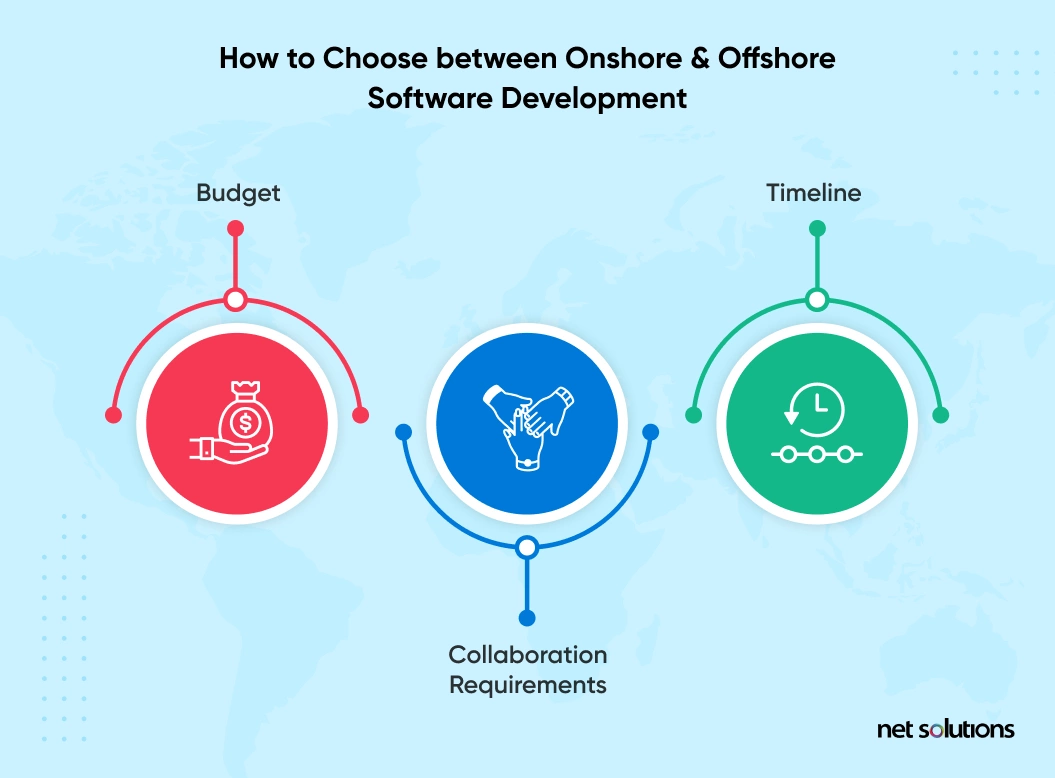
- Budget: What kind of budget has your company allotted for your software development project? Good software development is never cheap, but going offshore can get you much more bang for your buck.
- Collaboration requirements: Would you benefit from live, real-time meetings? If so, you should consider either an onshore developer or an offshore developer who can adapt to your hours.
- Timeline: Does your project require a quick turnaround? An experienced offshore outsourced partner can often turn things around faster than someone local.
Onshore vs. Offshore: Which Is Better?
Both onshore and offshore software development has advantages and disadvantages, and there’s no one-size-fits-all answer to this question. The final choice will be based on the location, needs, organizational culture, and budget.
A local development partner might make sense if your company requires in-person meetings and would benefit from working with partners subject to similar rules and regulations.
On the other hand, if you’re looking to stretch your budget without compromising quality, a thoroughly-vetted offshore development firm can help.
Are you considering outsourcing to an experienced team in India? For more than 20 years, we’ve been a trusted partner to global eCommerce start-ups and enterprises for over a decade’s experience and knowledge, designing, developing, and testing apps for internationally renowned organizations like IMG, Euro Car Parts, and the Harvard Business Review.
Frequently Asked Questions
Nearshore development refers to outsourcing to a firm headquartered in a nearby country. For example, a US firm outsourcing its work to a firm headquartered in Canada. It can bring in a semblance of working within the same office. Labor remains less expensive than onshore outsourcing, but maybe not as less as offshore. Nearshore outsourcing is, therefore, the middle ground between offshore and onshore outsourcing.
There’s no simple answer to this question. Choosing the best outsourcing model for your business will depend on your company’s needs. This blog post provides an honest analysis of the pros and cons of offshore outsourcing, along with the advantages and disadvantages of onshore outsourcing. It will help you make an informed decision when choosing an outsourcing strategy and an outsourcing partner.
Security risks are bound to occur in outsourcing, given the sensitive nature of the data. Standards compliance is core to any software project e:g, the ISO 27001 certification, which is proof that a company has been audited for security and is compliant with basic legal and regulatory specifications. Using dedicated VPN connections is another aspect to consider for secure data transfers. Plus, keep track of all documentation and specify the security metrics needed on every project. Given that progressive, agile methodologies require close collaboration, extra vigilance across all digital touchpoints is necessary. Define processes such as server administration, security practices, protection of vulnerable data and information management, and ways of mitigating all risks. Is the outsourced partner compliant with PCI-DSS, GDPR, or HIPAA requirements? Are there adequate NDA processes in place? These factors should help you take care of the security concerns.
A startup organization primarily works with limited resources and talent pool – with people often taking up multiple roles. Yet they’d like to speed up their time-to-market, take advice from experts to get the best out of their infrastructure and project plans and avoid technological gaps. Knowledge, experience, superior talent, and a skill-cost balance are primary reasons startups look at outsourcing software development. Outsourcing helps them be aligned to the market requirements, be agile, have a lean structure, and have easy scalability. Unless the technology itself is at the core of their unique proposition, most startups would prefer outsourcing software development and usually do so.






